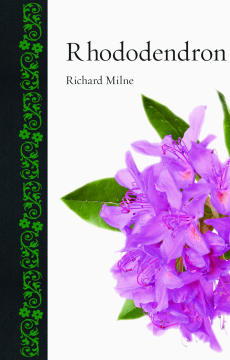
Additional Information
Book Details
Abstract
Has ever a plant inspired such love and such hatred as the rhododendron? Its beauty is inarguable; it can clothe whole hillsides and gardens with a blanket of vibrant color. The rhododendron has a propensity towards sexual infidelity, making it very popular with horticultural breeding programs. And it can also be used as an herbal remedy for an astonishing range of ailments.
But there is a darker side to these gorgeous flowers. Daphne du Maurier used the red rhododendron as a symbol of blood in her best-selling novel Rebecca, and numerous Chinese folktales link the plant with tragedy and death. It can poison livestock and intoxicate humans, and its narcotic honey has been used as a weapon of war. Rhododendron ponticum has run riot across the British countryside, but the full story of this implacable invader contains many fascinating surprises.
In this beautifully illustrated volume, Richard Milne explores the many ways in which the rhododendron has influenced human societies, relating this to the extraordinary story of the plant’s evolution. Over one thousand species of the plant exist, ranging from rugged trees on Himalayan slopes to rock-hugging alpines, and delicate plants perched on rainforest branches. Milne relays tales of mythical figures, intrepid collectors, and eccentric plant breeders. However much you may think you know about the rhododendron, this charming book will offer something new.
“An enlightening and accessible account of a sometimes maligned genus, covering its evolution, cultural significance, and social impact. . . . Filled with engaging anecdotes about the exploits of early plant collectors and the motley group of plant breeders who fed the public appetite for rhododendrons. . . . Milne has the skill to communicate his knowledge clearly. He writes with a light touch and with a passion that makes the book accessible to gardeners who do not share his botanical background.”
— Gardens Illustrated
"For most of their existence, rhododendrons (and azaleas—their better-known brethren) have been the botanical equivalent of wallpaper. Milne provides 235 color photographs; yet so seductive are the money shots that not one shows a plant not in bloom. The urgency of the demand for such images is driven home by two facing pages that show 40 different blossoms. After a slow but necessary explanation of hybridization and taxonomic protocols, Milne methodically takes the reader through the plant's history in Britain; the creation of cultivars (‘he crossed everything with rhododendrons except the chickens’); the story of weary collectors battling ocean-going pirates, recalcitrant bureaucrats, spies, armies, and monsters (although Milne cheekily admits that ‘true monsters are, and always have been, human’); and the literary and artistic legacy of these plants in Asia and Europe. The author makes 527 referenced citations, provides an index with 401 entries, and lists associations and websites for those whose appetite for rhododendron flowers is not yet sated. Recommended."
— Choice
Richard Milne is a senior lecturer in the school of biology in the University of Edinburgh.
Table of Contents
| Section Title | Page | Action | Price |
|---|---|---|---|
| Cover | Cover | ||
| Rhododendron | 3 | ||
| Imprint Page | 4 | ||
| Contents | 5 | ||
| Introduction: Beauty and Bane | 7 | ||
| One: Sex and the Single Rhododendron | 16 | ||
| Two: The Fall and Rise of Azalea | 33 | ||
| Three: Rhododendromania | 48 | ||
| Four: Glasshouse Sensations | 75 | ||
| Five: The Home of the Rhododendrons | 91 | ||
| Six: Potions, Petals and Poisons | 114 | ||
| Seven: The Tears of the Cuckoo | 136 | ||
| Eight: Black Sheep: The Tale of Rhododendron ponticum | 154 | ||
| Nine: Conservation, Collections and the Future | 175 | ||
| Timeline | 195 | ||
| Appendix: Table of Groups within Rhododendron | 198 | ||
| References | 201 | ||
| Further Reading | 225 | ||
| Associations and Websites | 226 | ||
| Acknowledgements | 228 | ||
| Photo Acknowledgements | 229 | ||
| Index | 230 |
